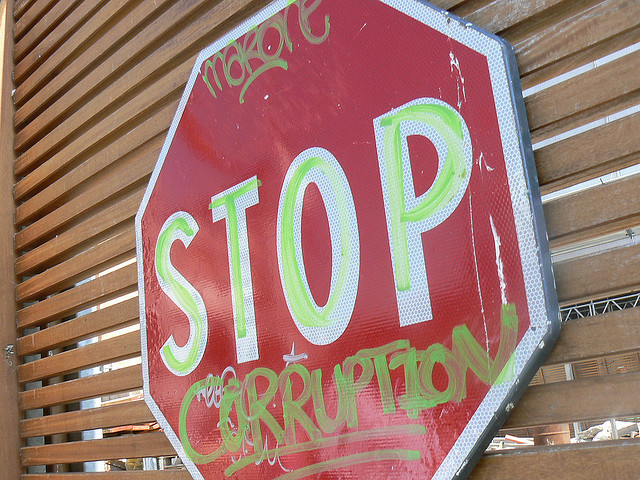"What young people can do to stop corruption"
February 25 Corruption is all too evident in today’s world, writes Latoyaa Roberts, 26, a Commonwealth Correspondent from Trinidad and Tobago. But she argues that young people can fight corruption by being involved and advocating for transparency and justice.
Corruption is all too evident in today’s world, writes Latoyaa Roberts, 26, a Commonwealth Correspondent from Trinidad and Tobago. But she argues that young people can fight corruption by being involved and advocating for transparency and justice.
Every day on various forms of mass media, I hear constant reports about alleged corruption, misappropriation of funds and resources and failing governments. So I decided to take to task and ask a few of my coworkers what they thought about corruption.
A poll of colleagues revealed the following synonyms for corruption: white collar crime, cheating, bribery, a dishonest politician or businessman, bid rigging, unfair games, nepotism, unfair employment and favoritism. Their opinions are echoed in the definition offered by Dr. Elaine Byrne in her book, Political Corruption in Ireland. She states that “the challenge is to distinguish between systemic and individual corruption; petty and grand corruption; moral and legal corruption; and rumours and reality of corruption.” This definition clearly highlights the complexity of the term used loosely daily. Corruption seems to be intentional but there are numerous solutions which young persons can use to address this problem in their country.
Systemic corruption prevails when devious acts saturate the economic, political and social system of a country. This is one of the hardest types of corruption to counteract. However, firstly young citizens must be aware of the rules, laws and regulations in their country and exercise their political rights and responsibilities to combat the immorality. Secondly, existing structures must be used as checks and balances to address the situations in countries. There are many tribunals and commission surfacing daily to address all these issues. However, are young people often apart of this committees? Youths must become active members of organizations, lobbying groups and pressure groups that reinforce principles of democracy, fairness and justice in a country.
Many businessmen and politicians, who are our world leaders and supposedly exemplars, also perpetrate corrupt acts daily. Their individual influence cannot be underestimated and the culprits’ ultimate aim is to destroy many people’s lives while achieving their selfish gains. On the other hand, young persons within organization are well positioned to agitate and apply positive peer pressure in these negative situations. Furthermore, young people being tech savvy can use social media and innovation to sensitize the public and embarrass the wrong doers if traditional channels of protest, the police or the judicial system fail.
Often corruption is delineated by the semantics of big lie and small white lie syndrome, which parallels the concepts of petty and grand corruption. Young persons should be impartial and protest against all forms of corruption. They should acquire the skills to discern corrupt acts. Ultimately, if one condones a small corrupt event such as wrongly awarding a student as valedictorian of a school’s graduation as opposed to a larger issue such as one’s appointment to a commission based on nepotism rather than merit, how can one protest? Youths must always advocate for transparency and justice through the moral values that are instilled in them. By rejection of any corrupt act whether big or small, it will reduce corruption within the society.
A renowned politician in my country once stated that “politics has a morality of its own”. However, I believe there should be no exceptions. The laws of a land and daily practices of the community are based on the mores and values of the society. Consequently, the primary agents of socialization such as the family, school and community continue to play a pivotal role and denounce any effort of corruption. Youths must continue to translate the values which were inculcated through these agents of socialization and the values must be translated from generation to generation.
Additionally, youths must elevate to more leadership roles locally, regionally and internationally and continue to advocate for transparency, peace, equity and justice for all. As future leaders, young persons should avail themselves of information and training that allows them to become responsible leaders and advocators of the truth in spite of the consequences. Corruption should not become a norm in today’s society. Let us as youths of today stand up for what is right to ensure we have a successful future.
photo credit: kmillard92 via photopin cc
………………………………………………………………………………………………………………
About me:
The world is my oyster and I love exploring it. My best exploration thus far was as an English teacher in Japan, frequently visiting other Asian countries. Now, I am a Secondary School English teacher in my country but in the future I want to become a Communications Specialist for an international organization.
My first degree is in Communication Studies with Linguistics and International Relations. I also obtained a M.Sc in Global Studies and I am currently pursuing a M. Phil in International Relations.
………………………………………………………………………………………………………
Opinions expressed in this article are those of the author and do not necessarily represent the views of the Commonwealth Youth Programme. Articles are published in a spirit of dialogue, respect and understanding. If you disagree, why not submit a response?
To learn more about becoming a Commonwealth Correspondent please visit: http://www.yourcommonwealth.org/submit-articles/commonwealthcorrespondents/
…………………………………………………………………………………………………




